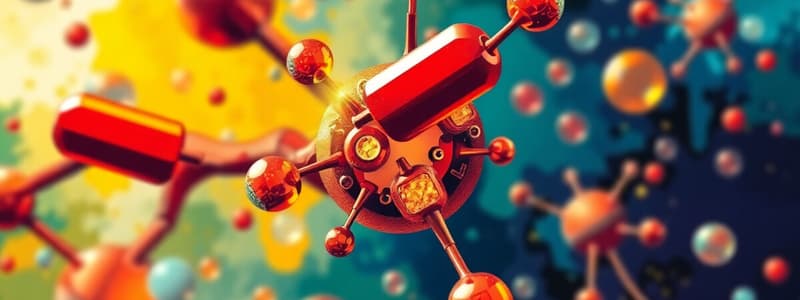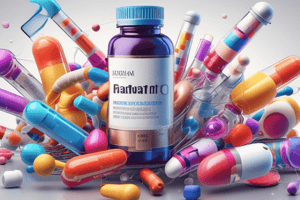Podcast
Questions and Answers
What is the study of drugs, their effects on the body, and their therapeutic applications called?
What is the study of drugs, their effects on the body, and their therapeutic applications called?
- Pharmaceutics
- Pharmacodynamics
- Toxicology
- Pharmacology (correct)
How are medications classified?
How are medications classified?
- Their effect on the body
- Their mechanism of action
- Their therapeutic use
- All of the above (correct)
What does 'MOA' stand for in the context of pharmacology?
What does 'MOA' stand for in the context of pharmacology?
- Method of Analysis
- Molecular Organization
- Metabolic Output
- Mechanism of Action (correct)
Grouping drugs by the condition they treat is known as their:
Grouping drugs by the condition they treat is known as their:
What is the molecular structure of a drug associated with?
What is the molecular structure of a drug associated with?
Which of the following best describes pharmacokinetics?
Which of the following best describes pharmacokinetics?
What is the process by which a drug enters the bloodstream called?
What is the process by which a drug enters the bloodstream called?
Which route of administration provides 100% bioavailability?
Which route of administration provides 100% bioavailability?
What term refers to the transport of a drug from the bloodstream to the target tissues?
What term refers to the transport of a drug from the bloodstream to the target tissues?
What does it mean when a drug is 'protein bound'?
What does it mean when a drug is 'protein bound'?
What is the chemical alteration of a drug in the body called?
What is the chemical alteration of a drug in the body called?
Where does the first-pass effect primarily occur?
Where does the first-pass effect primarily occur?
What is the process of removing drugs and their metabolites from the body called?
What is the process of removing drugs and their metabolites from the body called?
What is the primary route of excretion for drugs?
What is the primary route of excretion for drugs?
What is the study of the therapeutic and adverse effects of drugs called?
What is the study of the therapeutic and adverse effects of drugs called?
What happens when an agonist binds to a receptor?
What happens when an agonist binds to a receptor?
What do antagonists do?
What do antagonists do?
What is the dose required to produce the desired effect in 50% of patients called?
What is the dose required to produce the desired effect in 50% of patients called?
What is the dose that causes death in 50% of test subjects termed?
What is the dose that causes death in 50% of test subjects termed?
What does a high Therapeutic Index (TI) indicate about a drug?
What does a high Therapeutic Index (TI) indicate about a drug?
Flashcards
Pharmacology
Pharmacology
The study of drugs, their effects on the body, and their therapeutic applications.
Mechanism of Action (MOA)
Mechanism of Action (MOA)
How a drug interacts with receptors, enzymes, or cell structures to produce effects.
Therapeutic Class
Therapeutic Class
Grouped by the condition they treat (e.g., antihypertensives, analgesics).
Pharmacokinetics
Pharmacokinetics
Signup and view all the flashcards
Absorption
Absorption
Signup and view all the flashcards
Distribution
Distribution
Signup and view all the flashcards
Metabolism (Biotransformation)
Metabolism (Biotransformation)
Signup and view all the flashcards
Excretion
Excretion
Signup and view all the flashcards
Pharmacodynamics
Pharmacodynamics
Signup and view all the flashcards
Agonists
Agonists
Signup and view all the flashcards
Antagonists
Antagonists
Signup and view all the flashcards
Therapeutic Dose (ED50)
Therapeutic Dose (ED50)
Signup and view all the flashcards
Half-Life (t½)
Half-Life (t½)
Signup and view all the flashcards
Loading Dose
Loading Dose
Signup and view all the flashcards
First-Order Elimination
First-Order Elimination
Signup and view all the flashcards
Zero-Order Elimination
Zero-Order Elimination
Signup and view all the flashcards
Prescription Drugs (Rx)
Prescription Drugs (Rx)
Signup and view all the flashcards
Over-the-Counter Drugs (OTC)
Over-the-Counter Drugs (OTC)
Signup and view all the flashcards
DEA (Drug Enforcement Administration)
DEA (Drug Enforcement Administration)
Signup and view all the flashcards
FDA (Food and Drug Administration)
FDA (Food and Drug Administration)
Signup and view all the flashcards




